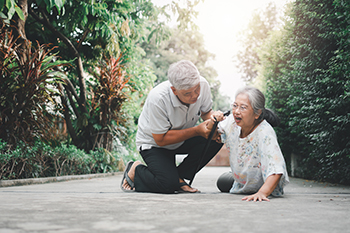
As one ages, the repercussions of falling increase. Studies show that people over 65 years old fall at least once a year. Further, one out of five falls results in serious injury. It is commonly held that safety proofing in the home is essential in preventing falls. Other experts agree that keeping a positive attitude and not being afraid of falling is just as important. One of the main recommendations is to have a plan in place in case you do fall. Some people use medical alert devices or carry a phone with them at all times. Practice getting up from the floor in order to be more prepared if you should take a tumble. Changing the way you handle problems is another way to prevent falls. For instance, ask for help rather than get on a ladder to reach a top shelf. Removing hazards, such as loose wiring and scatter rugs from your home is also recommended. Have walking aids available for times when you feel less sure on your feet. Balance and strength exercises are a good way to keep your legs and feet under you. See a podiatrist for more information on ways to prevent falling.
Preventing falls among the elderly is very important. If you are older and have fallen or fear that you are prone to falling, consult with Emmanuel Bustos, DPM from New York. Our doctor will assess your condition and provide you with quality advice and care.
Every 11 seconds, an elderly American is being treated in an emergency room for a fall related injury. Falls are the leading cause of head and hip injuries for those 65 and older. Due to decreases in strength, balance, senses, and lack of awareness, elderly persons are very susceptible to falling. Thankfully, there are a number of things older persons can do to prevent falls.
How to Prevent Falls
Some effective methods that older persons can do to prevent falls include:
- Enrolling in strength and balance exercise program to increase balance and strength
- Periodically having your sight and hearing checked
- Discuss any medications you have with a doctor to see if it increases the risk of falling
- Clearing the house of falling hazards and installing devices like grab bars and railings
- Utilizing a walker or cane
- Wearing shoes that provide good support and cushioning
- Talking to family members about falling and increasing awareness
Falling can be a traumatic and embarrassing experience for elderly persons; this can make them less willing to leave the house, and less willing to talk to someone about their fears of falling. Doing such things, however, will increase the likelihood of tripping or losing one’s balance. Knowing the causes of falling and how to prevent them is the best way to mitigate the risk of serious injury.
If you have any questions, please feel free to contact our office located in New York, NY . We offer the newest diagnostic and treatment technologies for all your foot care needs.